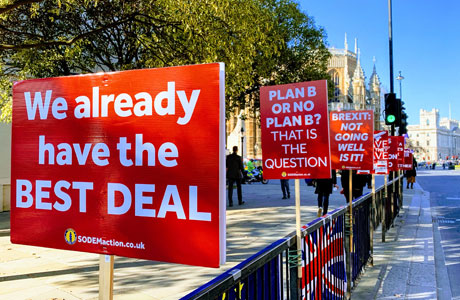- Home
- News and events
- Find news
- The British self-confidence dented by Brexit
The British self-confidence dented by Brexit
 Brexit with or without an agreement? Exit in October or January? New election? New referendum? The questions concerning Great Britain’s future are clearly outnumbered by the answers, and it can be difficult to follow what’s happening and why. Jens Norrby, PhD student in History of Ideas, helps us understand the current situation.
Brexit with or without an agreement? Exit in October or January? New election? New referendum? The questions concerning Great Britain’s future are clearly outnumbered by the answers, and it can be difficult to follow what’s happening and why. Jens Norrby, PhD student in History of Ideas, helps us understand the current situation.
Many of us follow the convulsions in Great Britain, where the country is trying to proceed in the heated subject about the country’s future relations with the EU. On Thursday, the Prime Minister Boris Johnson said that he “rather be dead in a ditch, than ask the EU to delay Brexit”. Johnson had earlier said that the country would leave the EU on 31 October, “do or die”, but during the week, we have noticed that the members of the Parliament seem to have a different opinion.
 Jens Norrby is a PhD student in History of Ideas at the University of Gothenburg. His research focus is the history of Great Britain and Europe, national identity, the fall of the British Empire and Brexit.
Jens Norrby is a PhD student in History of Ideas at the University of Gothenburg. His research focus is the history of Great Britain and Europe, national identity, the fall of the British Empire and Brexit.
What can the political pandemonium taking place in Great Britain tell us about the British self-image?
“The most instant answer is a very hard blow on the country’s political self-image. The traditional image is that the British are rational, and that their pragmatism has protected them from the continent’s revolutions and dictatorships. In “The Mother of Parliaments”, political questions have been raised and discussed by the world’s rhetorical elite, trained in this art since their boyhood years at Eton. Of course, this is a very simplified and exaggerated picture I present to you, but the British elite has in the last few years been hit by a real eye-opener. And during her speech in parliament on Wednesday, Labour’s Thelma Walker said that Brexit had made Britain the laughing stock of the entire world. So, their self-confidence is seriously dented, simply put.”
Can you draw any historical parallels to the drama we’re observing now?
“That depends of course from which viewpoint we are looking from. One of the most striking features of Britain’s membership in the EU has been the continuous subordination to party politics. One of the most striking features of Britain’s membership of the EU has been the constant subordination to party politics. The internal conflicts in the Labour party was perhaps the biggest reason why Harold Wilson called for a referendum on the issue of membership in 1975, and it’s often argued that it was Margret Thatcher’s attitude towards Europe that in the end contributed to her downfall within her own party. And Tony Blair’s large success in his first years was, among other things, a result of his political opponents, the Tories, being at odds in the EU matter.”
And if we move to the 2010’s?
“It’s clear that David Cameron initiated the referendum about Brexit mainly to save his party, the Tories. Teresa May also tried to balance the party’s different wings. Labour has, at the same time, been almost incapable of presenting a clear and consistent strategy. It is remarkably difficult to find a single British politician that that is genuinely invested in the question of Europe beyond the immediate issue of the Referendum.”
But why this mess?
“One of the more overall reasons is that the result of the referendum in 2016 could be interpreted in at least three different ways. As an expression of identity, where the British people’s will to leave Europe had to be honoured, no matter what the cost. Others interpreted the result as an expression of the people’s will against the elite. While another group interpreted the result as a faulty financial analysis, where the “leave”-campaign was accused of telling lies about the financial consequences—consequences that had to be avoided at all costs. On top of these three interpretations came the party politics I mentioned earlier, and since 2016 we have had a large number of forces that have been pulling in different directions—all of them certain that they are acting in the best interest of the people.”
A qualified guess on the finale of this?
“Of course, I can guess. My fear is that Dominic Cummings has a brilliant plan, so my guess is that there will be a new election before the end of October, where Johnson will get a large majority, the new parliament will make a No-Deal possible again, and that the Great Britain will tumble out of the Union on 31 October. Or something completely different.”
Contact:
Jens Norrby, PhD student in History of Ideas, phone: +46 76 884 17 24, e-mail: jens.norrby@lir.gu.se
Photo from London: John Cameron